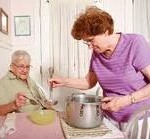 Our elderly loved ones often experience some from of anxiety and depression as they age, whether they’re dealing with life changes like retirement, death of a spouse, health problems or even an overwhelming concern about their own future. But caregivers, especially adult children, are often prone to their own anxiety and worries. More than 1 in 10 family caregivers report that caregiving has caused their own health to deteriorate, so it’s important to recognize the signs of anxiety and take care of yourself.
Our elderly loved ones often experience some from of anxiety and depression as they age, whether they’re dealing with life changes like retirement, death of a spouse, health problems or even an overwhelming concern about their own future. But caregivers, especially adult children, are often prone to their own anxiety and worries. More than 1 in 10 family caregivers report that caregiving has caused their own health to deteriorate, so it’s important to recognize the signs of anxiety and take care of yourself.
So, what exactly is anxiety? According to the American Psychological Association, anxiety is an emotion that creates feelings of tension, worry, and increased blood pressure. Signs of anxiety can include:
• racing thoughts and worries that arise throughout the day
• anticipating the worst case scenario and making unnecessary adjustments to your life and your loved ones in response.
• sense of panic
• physical symptoms like sweating, rapid heartbeat, dizziness and trembling.
• weight loss, weight gain, hair loss, stomach discomfort
Some of these symptoms can become so severe you may actually think you’re having a heart attack. But don’t let anxiety get out of control. Once you recognize the signs, you can control it head on with these self-help tips:
• Breathing exercises, relaxation techniques
• Practice Yoga or meditation
• Eat healthy
• Reduce alcohol and nicotine intake
• Get enough sleep
• Have fun and relax
• Get help with your responsibilities
Sometimes the symptoms of anxiety may be severe enough that they’re causing extreme distress and disrupting your daily routine, then it’s time to consult a physician who may suggest cognitive behavior therapy or medication.
Your Next Move can help you locate the perfect senior housing for your aging loved one. Our team of relocation specialists are also with you through every step of the transition process including home sale, downsizing, estate sales and moving household goods.
This blog post is brought to you by the team at Your Next Move. If you are interested in further information you may contact us below. LIKE us on Facebook and follow us on Twitter to get the most current communication on the subject of senior relocation. Please join our mailing list.
Your Next Move, Easing Your Senior Transition
Julie Kopetsky, President
www.yournextmovenc.com
919-601-8203
Julie.kopetsky@yournextmovenc.com